di Veronica Galletta
[ITA] [ENG]

Da qualche tempo mi interesso di scacchi. È la disciplina che pratica mio figlio, e così è cominciato il mio rapporto con loro, in maniera spezzettata, discontinua. Come per osmosi, attraverso la membrana del linguaggio, lascio che il flusso mi arrivi; orecchio facendo altro, appunto le espressioni, i modi di dire. Mentre mio figlio gioca e studia, io mi faccio invadere dalle parole.
Matto del corridoio, matto affogato, vantaggio posizionale.
Le appunto su un quaderno, le metto in fila, le lascio lievitare. Cerco di seguire le loro strade. Il corridoio del matto lo immagino pieno di porte, come in Shining; il matto affogato, invece, sarà la storia di un re che non sapeva nuotare. Il vantaggio posizionale no, lui non mi piace: puzza di classismo.
A volte invento delle storie, che gli racconto quando lo accompagno a giocare. Mentre prepariamo lo zaino, fra una merenda e un succo di frutta, infilo qualche pezzo di storia. Gli scacchisti sono molto scaramantici, così si dice, e noi allora contiamo passi, scegliamo penne, pratichiamo riti. E intanto, io invento. «La vedi quella statua?», gli dico mentre aspettiamo che sia l’ora per giocare. «Sembra una statua come un’altra, ma guardala bene: ogni giorno sul basamento ci sarà scritta sopra una mossa diversa: sono messaggi in codice che dobbiamo decifrare. Ce li manda una signora russa», dico. Lui mi guarda, mi fa cenno di proseguire. «Era una giocatrice fortissima, la più grande di tutti i tempi. Vive in incognito da moltissimi anni. Ogni giorno una mossa diversa, che unita al tuo risultato di oggi ci porta verso la sua casa», aggiungo. «Adesso nella storia ci starebbe bene se vincessi, ma vedi tu. Provaci».
Mio figlio mi ascolta, sorride, sospeso fra la realtà e il desiderio. «Ma cosa dici, mamma, è una stupidaggine», dice. «Però continua a raccontare», aggiunge.
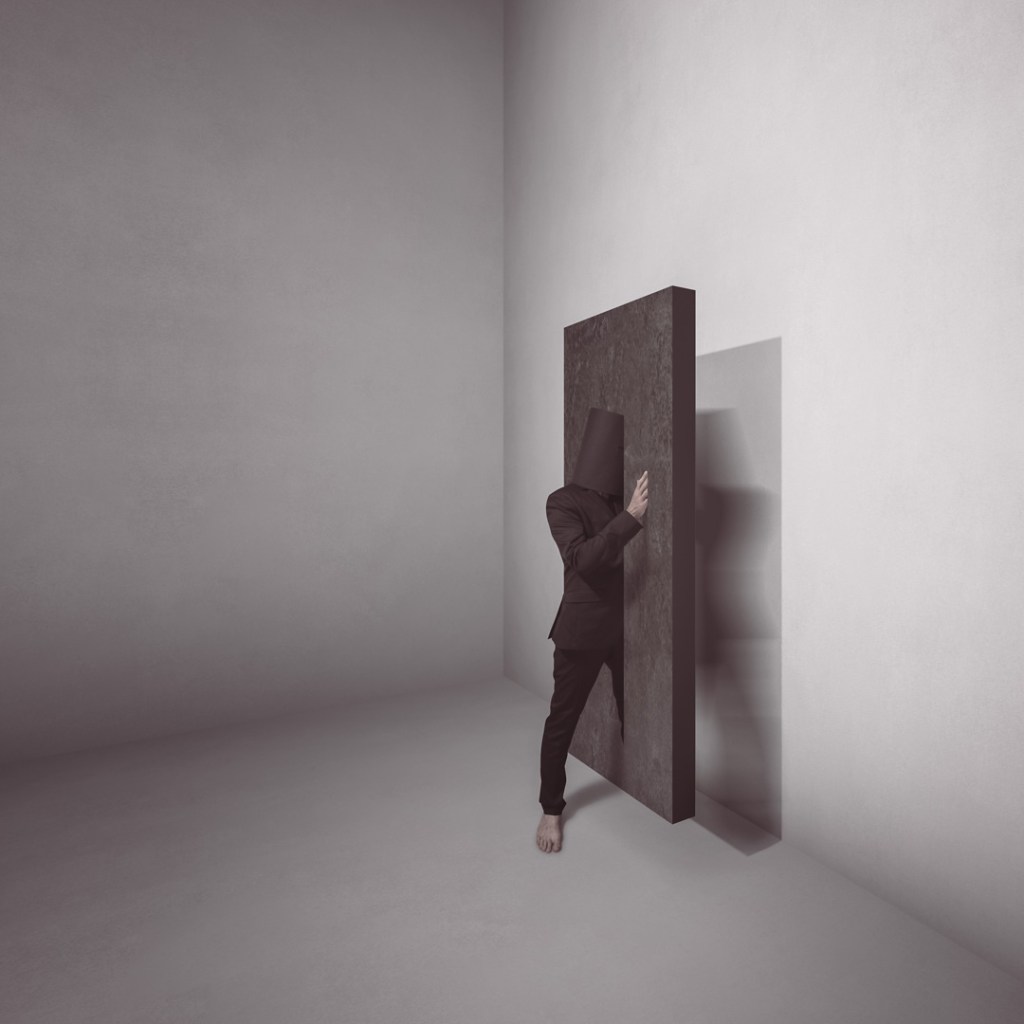
Mi interesso di scacchi per osmosi, ma conservo la mia natura frammentaria. «Mi serve per scrivere», spiego a mio figlio. «Sapere di molte cose, e tutte male. Non è perché sono pigra», preciso girando per la casa mentre imito il suo parlare, cambio di pezzi, preparazione casalinga, matto artistico, «non è perché non ne ho voglia, che non imparo anche io a giocare a scacchi. È perché seguo Primo Levi».
Lo dice ne L’altrui mestiere. «Sto parlando qui di una mia vecchia debolezza, che è quella di occuparmi a ore perse di cose che non capisco, non per edificarmi una cultura organica, ma per puro divertimento: il diletto incontaminato dei dilettanti. Preferisco orecchiare che ascoltare, spiare dai buchi di serratura invece di spaziare sui panorami vasti e solenni; preferisco rigirare tra le dita una singolare tessera invece di contemplare il mosaico nella sua interezza. […] preferisco il particolare al generale, le letture saltuarie e sminuzzate a quelle sistematiche».
Da anni quindi appunto parole e modi di dire, rigiro le mie tessere, sminuzzo, invento. Poi lo scorso novembre è cominciato il Campionato del mondo di scacchi, e i miei brandelli inventati, i protagonisti smozzicati, i miei racconti estemporanei, hanno cominciato a vibrare tutti insieme, come spiritelli di una storia nuova.
Magnus Carlsen, norvegese, è il campione in carica dal 2013. Trentuno anni, ex bambino prodigio, punteggio ELO 2882, capace in ogni genere di tempo di gioco, da quello standard a quello rapid fino al blitz. Granitico e ostico come le due consonanti del suo nome una dietro l’altra, la g dura e poi la n. È l’idolo di mio figlio, che ne custodisce una foto in camera. Jan Nepomnjaščij, russo, è lo sfidante. Stessa età di Carlsen, svelto come il suo nome di sole tre lettere, si muove velocemente sulla scacchiera e non solo. Cambia spesso posizione del corpo, incrocia le braccia, infila un piede sotto l’altro, si agita sulla poltrona, si alza quasi dopo ogni mossa.
Sul palco di quello che sembra un piccolo teatro, protetti da un vetro che accentua l’effetto scenografico, ci sono i due sfidanti seduti al tavolo. Davanti a loro la scacchiera, l’orologio, i formulari. Vestono in maniera simile: pantaloni scuri, camicia bianca, giacca. Sono simili anche per corporatura, incarnato, colori. Solo, Nepomnjaščij – Nepo, come lo chiama mio figlio –, ha la nuca rasata e un codino alto da combattente mongolo. Li guardiamo giocare, e mentre loro pensano mi pare di vedere coagularsi sopra le loro teste gli anni passati a studiare, fino a formare una grossa nuvola che preme contro il soffitto, i cui filacci scendono, sfiorano i loro volti, carezzano le rughe delle ore di studio a cui si sono sottoposti negli anni, lasciando indietro tutto il resto.
Mi alzo, vado in cucina. Propongo uno yogurt, del pane e marmellata, preparo una merenda, e quando torno in sala posso guardare mio figlio, senza altri pensieri, il desiderio di preservarlo, l’idea che il talento più nobile sia quello sprecato. Torno a sedere accanto a lui, addento un toast e ricominciamo a guardare.
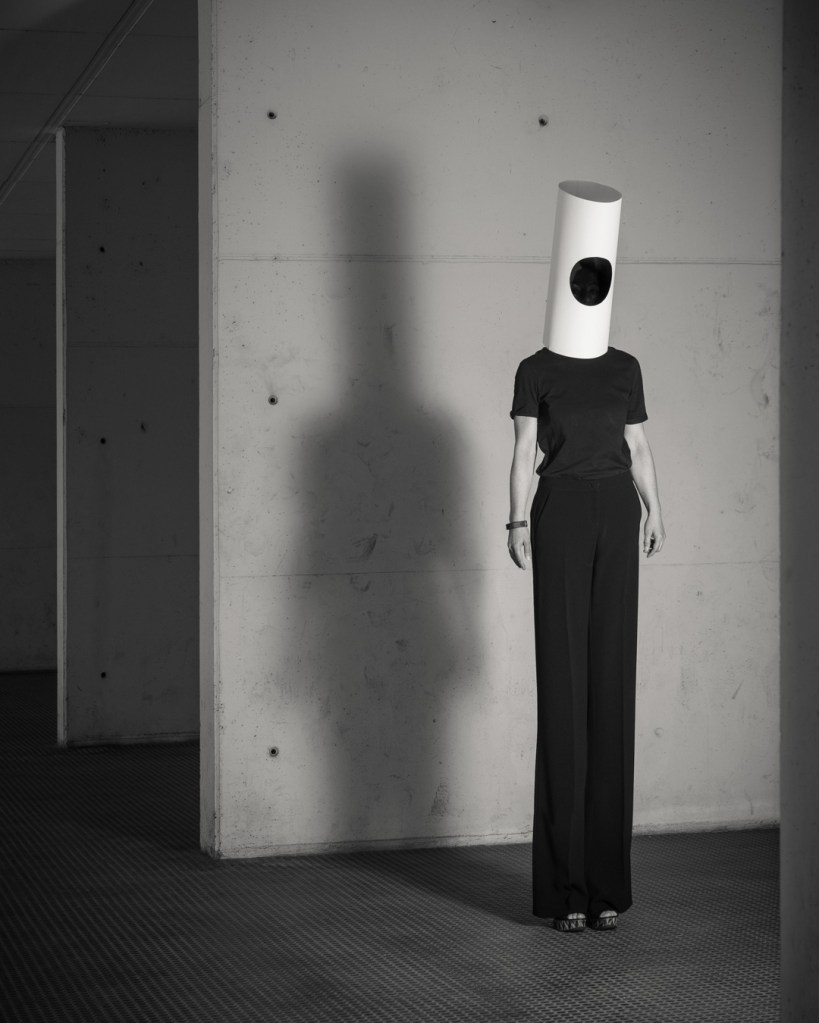
Gli sfidanti si affrontano secondo un calendario prefissato, fino a che uno dei due non totalizzi 7,5 punti; fino a che non si giochino quattordici partite. Cominciano nel pomeriggio presto, mentre mio figlio è ancora a scuola, ma non c’è fretta. Le partite sono lunghe, c’è tutto il tempo di tornare a casa, collegarsi, cominciare a guardare. È tutto molto lento, all’inizio. Partite caute, posizionali. Cinque patte, una dietro l’altra. Teniamo la televisione accesa, ascoltiamo il commento, e intanto leggiamo altro, chiacchieriamo.
Arriva la sesta partita. È venerdì, siamo fuori casa. Mi scrive un amico: stai seguendo Carlsen-Nepo? Hai visto cosa sta succedendo? Noi, che ci eravamo dimenticati, accendiamo sulla diretta senza sapere cosa aspettarci. Mio figlio guarda la scacchiera, studia la posizione. Io osservo i commentatori. Mi rigiro fra le mani la tessera, mi interesso di particolari. Seguo il commento del GM García Palermo, argentino naturalizzato italiano, che con accento divertito spiega le mosse, un occhio sempre a Stockfish, il motore scacchistico, che segnala le mosse migliori, ma, soprattutto, quelle peggiori. Accanto ai due sfidanti c’è la scacchiera virtuale, e mentre i minuti scorrono gli occhi sono tutti puntati alla barra verticale, in alto un giocatore, in basso l’altro. Quella barra è la vita nella sua implacabilità, che decreta, mossa dopo mossa, posizione dopo posizione, la probabilità di vittoria dei due campioni. Una barra che si muove di pochissimo, sempre intorno alla metà, e che i commentatori si divertono a fare salire o scendere con un simulatore, investigando le varie possibilità, nell’interminabile tempo in cui aspettiamo la mossa di Carlsen o Nepomnjaščij. È patta dice Stockfish. È patta dicono i commentatori ufficiali. È patta ripetono i commenti degli utenti collegati.
Questa partita dura da molte ore, più di sei, e mentre io e mio figlio sorridiamo ad ascoltare García Palermo che pronuncia escaco, o racconta di quando una volta ha giocato per dodici ore, qualcosa cambia. Carlsen riesce, mossa dopo mossa, a costruire una difesa del re, e poi a vincere. È un’imprecisione, quella di Nepomnjaščij, questo dirà poi l’analisi. Non un errore, solo una mossa meno efficace. Ma quel piccolo cedimento, quel tentennamento di posizione, è quanto basta a decidere la prosecuzione del mondiale. È la prima sconfitta di Nepomnjaščij, e tutto cambia.
Cambio anche io. Smetto di appuntarmi espressioni strane, niente più zugzwang o sfianchettamento, torri collegate o siciliana chiusa, niente più spiare dai buchi della serratura. Si è aperta la porta, ed ecco il panorama. Ci tocca guardare. Per i fanatici della struttura in tre atti, arriva il primo turning point.
«Guarda come trema, mamma», dice mio figlio. Nepomnjaščij capisce che ha perso, anche se ancora ci vuole tempo. Comincia a tremare mentre ci prepariamo al tempo che rimane, uno dei tanti aspetti feroci degli scacchi. Hai perso, ma ci vorrà ancora tanto. Un’ora, forse due. «Non voglio più guardare», dice mio figlio, e io spengo la diretta, anche se controvoglia. È giusto rispettarlo: lui sa cosa significa pensare che la partita sia patta e poi perdere tutto, io sono solo quella che inventa misteriose vecchie signore russe che lasciano mosse da decifrare su statue di città qualunque. «Sono passate più di sei ore, magari è solo stanchezza», dico per consolarlo, ma so anche io che non è vero. Trema, e alla fine perde. Sarà la partita più lunga mai disputata a un mondiale, quasi 8 ore per 136 mosse. Sono stanchi, sfiniti. Anche Carlsen non sembra soddisfatto, non sorride, come se gli mancasse il fiato. Li guardo, e di nuovo vedo i filacci degli anni passati a studiare scendere a sfiorargli il volto, arrivare alla gola, avvolgersi in spire.
La partita successiva, la settima, è una patta veloce, come tutti si aspettano. Partita di scarico: i due si riposano, riprendono energie.
L’ottava partita non la vediamo, mio figlio non è in casa e io controllo il risultato distrattamente, in un pomeriggio di lavoro. «Nepomnjaščij ha perso», gli dico d’istinto quando rientra, e poi rifletto. Non più Carlsen ha vinto, non è più Carlsen il protagonista di questa storia, l’eroe che si riconferma tale, ma l’altro. Lo sfidante che perde per la seconda volta, e cade. E nonostante tutto deve andare avanti, deve giocare. Non più dalla parte di Achille, ma dal lato di Ettore.
Mio figlio si collega per ascoltare il riepilogo e l’analisi finale dei commentatori, ma torna in camera quasi subito. «Perché hai smesso?», gli dico. «Mi dispiace troppo per Nepo», risponde, «non voglio guardare».

Alla nona partita la nostra attenzione è altissima, e il desiderio che Nepomnjaščij si rifaccia, altrettanto. In fondo Carlsen ha sempre tempo per vincere. Adesso ci starebbe bene una vittoria di Nepomnjaščij, e sembra saperlo anche lui, che siamo al midpoint dei nostri tre atti. Si presenta al tavolo con un nuovo taglio di capelli, via il codino, e mentre lo osservo, assediata dal valore simbolico del taglio, non riesco a non pensare che assomiglia ancora di più a Carlsen. Il simbolo si fa sinistro, mi appare Thomas Bernhard. Nepomnjaščij è il soccombente, e ancora non lo sa, o forse siamo noi a non saperlo, lui si sta solo offrendo al nostro sguardo, con un nuovo aspetto e il team tutto intorno a lui, compreso il suo maestro appena arrivato dalla Russia.
La partita comincia con un ritmo lento, e noi seguiamo facendo altro. Guardiamo i social, qualche video su youtube. Fino a che Nepomnjaščij muove e si alza di scatto, e altrettanto di scatto la barra di lato alla scacchiera schizza verso il nome di Carlsen come un punching ball a cui è stato tirato un pugno formidabile, mentre i commentatori urlano «Noooo, nooooo, nooooo».
Carlsen è nel retro. Non ha visto la mossa. Non ha visto Nepomnjaščij uscire. Trattengo il fiato. Il midpoint dei nostri tre atti è precipitato giù, andandosi a schiantare contro il secondo turning point, quello in cui tutto è perduto. Rientra, lo schermo perfetta quinta teatrale.
«Vieni!», urlo a mio figlio, «vieni, sta tornando a sedere», Carlsen si siede, «guardiamo che faccia fa», dico, mentre Carlsen storce la bocca, strabuzza gli occhi, si produce in una serie di smorfie. Cerca di capire se quello che vede è vero, cerca di capire dov’è il trucco. Non è possibile un errore così grossolano, non a un mondiale, non a quei livelli. Muove dopo aver pensato diversi minuti, la mossa logica per approfittare dell’errore dell’avversario. «Questo significa essere un campione», dicono i commentatori, «serietà e concentrazione». Muove, Carlsen, ma non si alza subito, nonostante non ci sia alcun dubbio, almeno per chi guarda da casa, la barra di Stockfish quasi brilla per il vantaggio consolidato. Carlsen però resta seduto: aspetta che Nepomnjaščij torni, e noi con lui. Venti minuti durante i quali stiamo in silenzio, davanti al televisore. Si chiama ellissi narrativa, vorrei dire a mio figlio. Ellissi narrativa, amore. Tutto si sta svolgendo dietro le quinte, e noi non lo vediamo. Non vediamo la faccia di Nepomnjaščij quando realizza cosa ha fatto. Non sappiamo se l’ha capito subito, mentre si alzava, oppure l’ha visto sullo schermo, dietro le quinte. Non vediamo la sua espressione, se abbia portato le mani al viso, a coprirselo, se si sia accartocciato a terra, per non vedere. Se abbia cercato meccanicamente quel codino appena tagliato. Non vediamo, e possiamo solo pensare, immaginare. Questa è la potenza delle storie, vorrei dire a mio figlio, questo innesca la nostra immaginazione, questo è La sventurata rispose, questo è lo svenimento della Marchesa von O di Kleist di cui parla Nicola Gardini in Lacuna, questo è Nepomnjaščij che vede da dietro le quinte la mossa di Carlsen, non ha il computer come noi, non ha il nostro divano e la nostra copertina, ma è comunque un campione. Vede la mossa, e capisce. Ellissi narrativa siamo noi che non abbiamo visto, sono quei venti minuti in cui abbiamo aspettato che Nepo arrivasse, e intanto la storia si è mossa dentro di noi, più forte e più intensa che se l’avessimo vista in diretta, che se fosse rientrato correndo, si fosse buttato a terra, disperandosi.

Cosa ha fatto in quei venti minuti, mentre il suo tempo sull’orologio si consumava irrimediabilmente, non lo sapremo mai, anche se potremmo scriverci un romanzo intero, che prosegue nell’ostinazione con la quale Carlsen resta seduto, nonostante Nepo non torni. Dopo aver mosso, dopo aver capito che aveva in mano la partita, non si è alzato. Ha aspettato, per guardare in faccia il suo avversario, per leggergli nell’affanno, nel risolino nervoso con il quale si è ripresentato, che il mondiale a questo punto era perso. La nuvola del suo studio sgonfia a terra, sfilacciata, inutile.
«Questo gioco cavalleresco e feroce è dunque poetico: tale è sentito da tutti coloro che lo hanno praticato, a qualsiasi livello, ma io penso che la ragione dell’irritabilità di poeti e scacchisti non risieda qui. I poeti […] hanno in comune con gli scacchisti la responsabilità totale dei loro atti», dice ancora Primo Levi ne Gli scacchisti irritabili, sempre da L’altrui mestiere, mentre Nepo perde ancora, all’undicesima partita, così male da sembrare inspiegabile. Qui ci sarebbe stata meglio una piccola rimonta, vorrei dire a mio figlio, sai, è una questione di climax, magari una partita vinta, anche una sola, per cui poi la caduta diventa meno attesa, e per questo più rovinosa. Ma non va così in questo mondiale e forse neanche nella vita, e poi a pensarci bene a me la struttura in tre atti è sempre stata antipatica.
Magnus Carlsen ha vinto il suo quinto titolo consecutivo con tre turni di anticipo, solido, granitico, e Nepomnjaščij ha perso, diventando il protagonista della storia. Perché i vincenti finiscono per scomparire dietro le loro vittorie, mentre nelle storie come nella vita ci appassionano i perdenti, chi cerca di risalire, chi ci prova anche se sa di perdere. Le mosse inspiegabili di Nepomnjaščij hanno trasformato il suo percorso in un suicidio dell’eroe, con sempre più persone che tifavano per lui, con i commentatori che si sbottonavano, ricordando i loro tornei andati male, confessando i loro momenti bui, gli amori finiti, i problemi di stranieri naturalizzati italiani in controluce, dolorosi. Per questo mi interesso di scacchi per osmosi, sminuzzo parole, mi rigiro fra le mani le tessere: nella lacuna, nell’ellissi della conoscenza trovo il mio spazio per l’intuizione, l’immaginazione, la creazione, vorrei dire mentre spegniamo la televisione.
«Cosa vuoi per cena?», dico invece, mentre mio figlio mi segue svogliato in cucina. Si siede, in silenzio. Gli metto davanti l’hamburger con le patatine.
«Mi spiace abbia perso così», dice. Allunga una mano sul piatto, prende una patatina. La affonda nella maionese, se la mette in bocca, comincia a masticare.
Veronica Galletta è nata a Siracusa e vive a Livorno. Ha un dottorato in ingegneria idraulica, un marito e un figlio. Ha scritto diversi racconti pubblicati su riviste online (Colla, L’inquieto, Abbiamo le prove). Con il monologo Sutta al giardino ha vinto nel 2013 il premio per monologhi teatrali PerVoceSola del Teatro della Tosse di Genova. Nel 2017, con Pelleossa, è stata finalista alla III edizione del Premio Neri Pozza. Le isole di Norman finalista della XXVIII edizione del Premio Calvino, è in libreria da aprile 2020 per le edizioni ItaloSvevo e si aggiudica il Premio Campiello Opera Prima. A ottobre 2021 è uscito per minimum fax il suo secondo romanzo, Nina sull’argine, per il quale è candidato al Premio Strega 2022.
L’editing è di Sara Mazzini e Antonio Russo De Vivo.
In the fool’s mate territory. Telling stories by the chessboard, or the noblest talent is the wasted one
by Veronica Galletta
Translated by Aurora Dell’Oro
For some time I’ve taken an interest in chess by osmosis. Chess is the discipline practiced by my son and as such almost four years ago my relationship with chess began in a broken, discontinuous way. Through the membrane of language, I let the flow come to me; I nibble distractedly, I write down the expressions, the way of sayings. While my son plays and studies, I open myself to verbal assault.
Fool’s mate, smothered mate, positional advantage.
I put them down in a notebook, I put them in a row, I let them bump up. I try to follow their tracks. I imagine the fool’s mate full of doors, like in Shining; the smothered mate must be the tale of a king who couldn’t swim. As for the positional advantage, I don’t like it: it stinks with classism.
Sometimes I come up with stories. I tell them when I drive him to play. While we prepare rucksacks and snacks repeating the same gestures over and over again, I let some slice of story slip in, just for distraction. The stammerers are very superstitious, as the saying goes, and then we count the steps, we choose the pens, we practice rites. “Do you see that statue?” I’m asking him when we are waiting for the time to play. “It looks like a statue just like any other, but look at it carefully: everyday on the pedestal there is written a different move: they are coded messages we ought to decipher. An old Russian lady is sending them to us. She was a great stammerer, the greatest of all time. She’s been living here, in disguise, for some years. Everyday a different move, which, added to your score of today, leads us to her house”, I say with a conspiring look on my face. “Now, it would be a nice plot twist if you won, but this is up to you. Give it a try”.
My son is listening to me, he smiles, he’s unsure whether to go along with me or not. “Don’t be silly, Mama” he says. “But go on telling”, he adds.
I got into chess by osmosis, but I preserve my fragmented nature. “I need it because of the writing”, I’m explaining to my son. “Knowing a bunch of things, and not well. It is not because I’m lazy”, I specify, while I’m going around in the house imitating his way of speaking, change of pieces, domestic training, artistic fool, “it isn’t because I wouldn’t like to learn to play chess. It is because I go after Primo Levi”. He says in Other People’s Trades:
Here I am referring to an old soft spot of mine, which is getting into the things I don’t understand in my spare time. Not with the aim to build a complete knowledge for myself, but for mere fun: the pure delight of the amateur. I prefer to nibble rather than to listen to, to spy by the keyhole rather than let my gaze wander over the great and solemn sceneries; I prefer to turn over a peculiar tile between my fingers rather than contemplate the whole mosaic. […] I prefer the particular to the general, the occasional and shredded readings to the systematic ones.
For four years, since when my son began playing chess, I have been writing down words and sayings, I have been turning over my tiles, I have been shredding them, I have been making up stories. But I have never watched a match with him, until last November the Chess International Championship took over and my invented scraps, the mumbled characters, my spare-time tales started to vibe all together, like sprites of a new story.
Magnus Carlsen, Norwegian, has been the defending champion since 2013. Thirty-one years old, once a wunderkind, ELO score 2882, he is capable of every kind of play time, from the standard one to the rapid ending, blitz included. One should give credit to the nomen omen, granitic and tough like the two consonants of his name, the hard “g” followed by the “n” . He is the idol of my son, who keeps a photo of him in his room. Jan Nepomnjaščij, Russian, is the opponent. Same age of Carlsen, fast like his three-lettered name, he moves swiftly both on and out the chessboard. He often changes the posture of his body: he crosses his arms, he puts one foot under the other, he stirs on the armchair, he stands up almost after every move.
On the screen, on the platform of a little theater, shielded by a glass which underlines the scenographic effect, there are the two challengers behind a table. In front of them there is the chessboard, the clock, the forms, the bottles of water. Their attire is quite similar: dark trousers, white shirt, and a jacket. They are alike also in their body shape, their complexion and colors. But Nepomnjaščij – Nepo, as my son renamed him –, has the neck shaved and a high pony-tail like a Mongolian warrior. We watch them play and while they are thinking, it seems I can see the years spent studying clotting upon their heads, until they make a big cloud pushing against the ceiling. Its strings go down, caressing their faces and the wrinkles hollowed by the studying time they committed to, leaving behind all the rest.
I spring up, I go to the kitchen. I suggest a yogurt, some bread and jam, I put a snack together and when I get back to the living room I can look at my son, with no other thoughts than the desire to preserve him, the idea that the noblest talent is the one that is wasted. I sit down next to him, I bite a sandwich and we get back watching.
The couple of challengers face each other according to a schedule, until one of them scores 7,5 points; until fourteen matches are played. They start in the early afternoon, while my son is still at school, but there’s no hurry. The meetings are long, there is plenty of time to come back home, connect to the channel and begin to watch. Cautious matches, positional. Five draws, one after another. We keep the TV on, listen to the comment and in the meantime we read something else, we chat.
Then the sixth match comes. It is Friday, we aren’t at home. A friend of mine wrote to me: are you after Carlsen-Nepo? Have you seen what’s up? We have forgotten. We turn the TV on, reluctantly. Ettore is watching the chessboard, he’s studying the setting. I am observing the broadcasters. I’m turning the tile over, I am interested in the details. I am listening to the comment of the GM García Palermo, a naturalized Italian Argentinian, who is remarking the moves and his own blunders with amusement, always keeping an eye on Stockfish, the chess engine, which tracks down the best moves and, more importantly, the worst ones. Besides the two opponents, there is the virtual chessboard and while the minutes are going by, everyone’s eyes are on the vertical bar, at the top there is one player and down below there’s the other one. That bar is life itself in its implacability, which states, one move after another, the statistics of victory. A bar which is moving very slowly, always lingering around its middle point. The commentators are enjoying themselves, going up and down with a simulator, making hypotheses and wondering about possibilities, in the unending period of time during which we are waiting for Carlesen or Nepomnjaščij to move. It’s a draw, Stockfish says; it’s a draw, the casters declare, it’s a draw, the comments around them repeats.
The sixth match started more than six hours ago and while my son and I are laughing with García Palermo saying escaco, or talking about that time when he played for twelve hours, something is changing. Carlsen succeeded, move after move, in building a defense for the king and then in winning. Nepomnjaščij wasn’t accurate, this is what the analysis would say afterwards. Not a mistake, just a less efficient move. But that little yielding, that hesitation in the position is enough to decide the following events. It was the first defeat for Nepomnjaščij and from that moment on, from the sixth match, everything changed.
I change too. I stop taking down weird expressions, no more zugzwang or sflanking (sfianchettamento in Italian, translator’s note), linked towers or closed Sicilian, no more spying through the keyhole. The door sprang open and there you go, the stage.
We ought to look at it. The first turning point is approaching, for the fanatics of the three acts’ structure.
“Look how trembling he is, Mama”, my son says. Nepomnjaščij realizes he has lost, even if there is still time. He begins to shake whereas we get ready for the remaining time, one of the many ferocious sides of chess. You lost, but you have to wait for an hour more, maybe two. «I don’t want to watch anymore», my son puts in and I turn the TV off, even if unwillingly. It is right to respect him: he knows what it means to think the match to be equal and then to lose it all. I am just the one making up mysterious old Russian ladies who write moves to be decoded on the statues of a city. “More than six hours went by, maybe he’s just tired” I say, trying to comfort him, but I, too, know it isn’t true. He trembles and then he loses.
At the end, it will be the longest match to be contested at an International Championship, almost eight hours for 136 moves. We go over the final part the day after. They are tired, exhausted. Carlsen too doesn’t seem to be satisfied, he doesn’t smile, as if he was out of breath. I am watching them and I see again the strings of the years spent studying going down to their faces, reaching their throat, coiling up in spires.
The next match, the seventh, is a quick draw, as everybody expected. Unloading match: the two of them are resting, regaining their strength.
We don’t watch the eighth match, my son isn’t at home and I look at the result inattentively, after a afternoon spent working. I am surprised by its briefness. “Nepomnjaščij lost”, I instinctively say to him, when he comes back home. Then I think. It is no more Carlsen winning, it isn’t Carlsen the main character of this tale, the reconfirmed hero, but it’s the other one. The opponent who loses for the second time and falls down. Notwithstanding, he must keep on going and play. Not by Achilles’ side, but rooting for Ettore.
My son turns the TV on to watch the summary and the final analysis of the broadcasters, but he goes back to his room almost at once. “Why aren’t you watching it?” I ask him. “I am so sorry for Nepo”, he answers, “I don’t want to look at it”.
At the ninth match our attention couldn’t be higher, as it is the desire for Nepomnjaščij to make up. After all, Carlsen can still win. Now it would be nice if Nepomnjaščij won and it seems he knows that we’ve got to the midpoint of our story in three acts. He comes up to the table with his hair cut, the pony-tail disappeared, he got rid of everything and while I am observing him, obsessed by the symbolic meaning of the cut, I can’t help but consider that he resembles Carlsen even more. The symbol becomes mysterious and I can’t help but think about Thomas Bernhard. Nepomnjaščij is the one who succumbs and he doesn’t know it yet or maybe we don’t know it, he is simply offering his new look to our gaze, surrounded by his team. It is said his teacher has come from Russia in a hurry to give him some help.
The match starts, the rhythm is slow, we are getting ready for the waiting distractedly, scrolling over the social pages, playing chess now and then elsewhere. Then Nepomnjaščij moves his piece and he stands up all at once and, at the same time, the bar next to the chessboard soars towards Carlsen’s name like a punching ball hit by a terrific punch, whereas the casters are shouting “Noooo, nooooo, nooooo”.
Carlsen isn’t at his place at the moment, he’s backstage eating or drinking something and when he comes back Nepomnjaščij isn’t there. He sits down. The midpoint of our three acts has fallen down, crushing against the second turning point, when everything has gone lost. “Come here”, I shout to Ettore, “come, Carlsen is coming back”, Carlsen sits down, “come on, let’s take a look at his face”, I say, while Carlsen turns up his mouth, rolls his eyes once, twice. He is trying to understand whether what he is looking at it’s true, he’s trying to understand where the trick is. Such a coarse mistake is not plausible, not during an international championship, not at those level of proficiency. He moves after having meditated for a few minutes, the logic moves to gain advantage over the opponent. “This is what it means to be a champion”, the broadcasters say, “commitment and concentration”. Carlsen moves, but he doesn’t stand up right away, although there is no doubt, at least for the spectators at home, the Stockfish bar almost shines because of the steady advantage. However, Carlsen remains still: he waits for Nepomnjaščij to get back and we are waiting with him. Twenty minutes during which we keep quiet, in front of the TV.
Narrative ellipsis, this is the name I would like to say to my son. Narrative ellipsis, my love. Everything is happening in the background and we can’t see it. We don’t see Nepomnjaščij’s face, when he grasps the meaning of what he did.
We don’t know whether he understood it right away, or he became conscious of it, looking at the screen in his changing room. We don’t see his face, we don’t know whether he hid his face behind his hands, or he crumbled on the floor because he didn’t want to see . We don’t know whether he searched mechanically for his pony-tail, just cut away. We don’t see and we can only think, try a guess. This is the power of the stories, I’d like to tell my son, this ignites our imagination, this is the wretched answered , this is the passing out of Kleist’s Marquise von O whom Nicola Gardini speaks about in Lacuna. This is Nepomnjaščij looking at Carlsen’s move from behind the scenes, he doesn’t have the computer like us, he doesn’t have our coach and our blanket, but he is a champion nonetheless. He looks at the move and he understands. Narrative ellipsis is us who didn’t see, is those twenty minutes during which we waited for Nepo to come and in the meanwhile the story moved inside us, stronger and deeper than it would have been if we had watched it live, if he had come back in a hurry, throwing himself on the ground, in despair.
What he did in those twenty minutes, while his time on the clock was running out irremediably, we shall never know, even if we could write a whole novel on it, which goes on with Carlsen’s stubbornness, who keeps sitting down, although Nepo doesn’t come back. After he moved, after he understood he was going to win, he didn’t rise up. He waited to look his opponent in the face, to read his anxiety, his nervous laugh with which we reintroduced himself, to write in his wrinkle that at this point the Championship was lost. The cloud of his commitment deflates and falls upon the ground, frayed, useless.
“This chivalrous and fiery game is then poetic: this is how it’s considered by all those who played it, at any level, but I think that the reason for the irritability of poets and chess players is not to be found here. They […] share the complete responsibility of their acts”, Primo Levi writes in The edgy chess players, from Other People’s Trades, while Nepo loses again, at the eleventh match, in such a bad way that seems to be inexplicable. Here a little comeback would have been better, I’d like to tell my son, you know, it is a matter of climax, maybe a win, maybe just one, so that the fall becomes less predictable and, for this very reason, more ruinous. But it isn’t going that way in this Championship and maybe either in life and moreover, thinking about it, I’ve always found the structure in three acts quite nasty.
Magnus Carlsen won his fifth title in a row, three rounds in advance, solid, granitic and Nepomnjaščij lost, becoming the main character of the story. Because the winners end up disappearing behind their victories, whereas in the tales, as in life, we are caught by the losers, by the ones who are striving to rise up, by the ones who are trying even if they know they are going to lose.
The inexplicable moves of Nepomnjaščij turned his path into a suicide of the hero, gaining more and more supporters, while the broadcasters rooted for him, remembering their lost tournaments, acknowledging their dark moments, the ended relationships, the painful problems of the foreigners, naturalized Italian, in the background. For this reason I took an interest in chess by osmosis. I’m grinding the words, I’m turning the cards among my fingers, because in the gap, in the lack of knowledge I find my space for intuition, imagination, creation, I’d like to say while we turn the TV off.
Instead “What do you want for dinner?”, I say, while my son is following me into the kitchen half-heartedly. He sits down in silence. I put the hamburger with the French fries in front of him.
“I’m sorry he lost just like that”, says. He reaches out a hand to pick up a French fry from the plate. He dives it into the mayonnaise, puts it in his mouth, and starts to chew.
Veronica Galletta was born in Siracusa and she lives in Livorno. She has a phD in Hydraulic Engineering, a husband and a son. She wrote several short stories published online (Colla, L’Inquieto, Abbiamo le prove). In 2013 her piece Sutta al giardino won the prize for theatrical monologue PerVoceSola at Teatro della Tosse in Genoa. In 2017, with Pelleossa, she was finalist at the III edition of Premio Neri Pozza. Her novel, Le isole di Norman, finalist at the XXVIII edition of Premio Calvino, was published in April 2020 by ItaloSvevo edition and won the Premio Campiello Opera Prima. In October 2021 her second novel, Nina sull’argine, was published by minimum fax and it is candidate to Premio Strega 2022.
Editing by Sara Mazzini and Antonio Russo De Vivo.

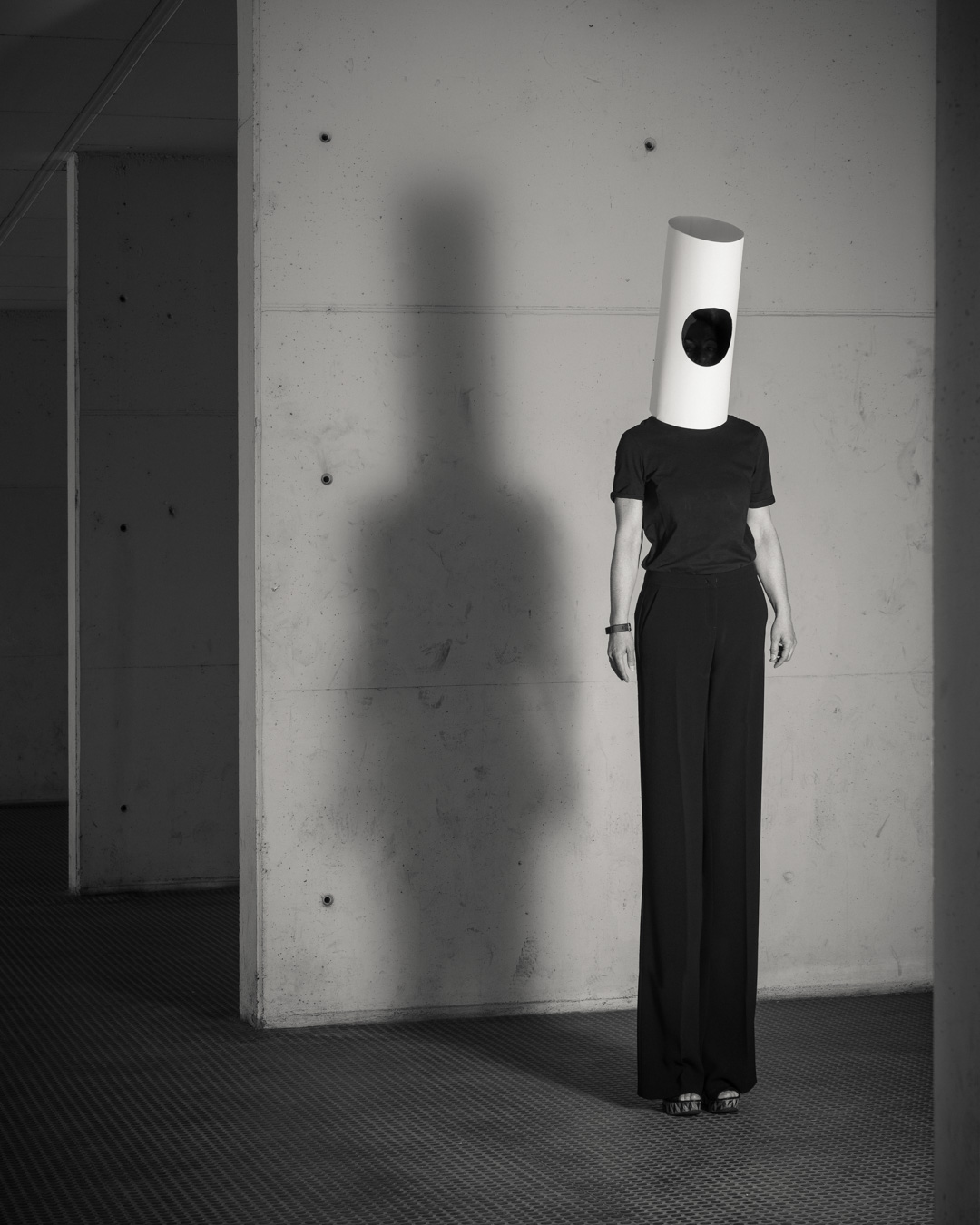

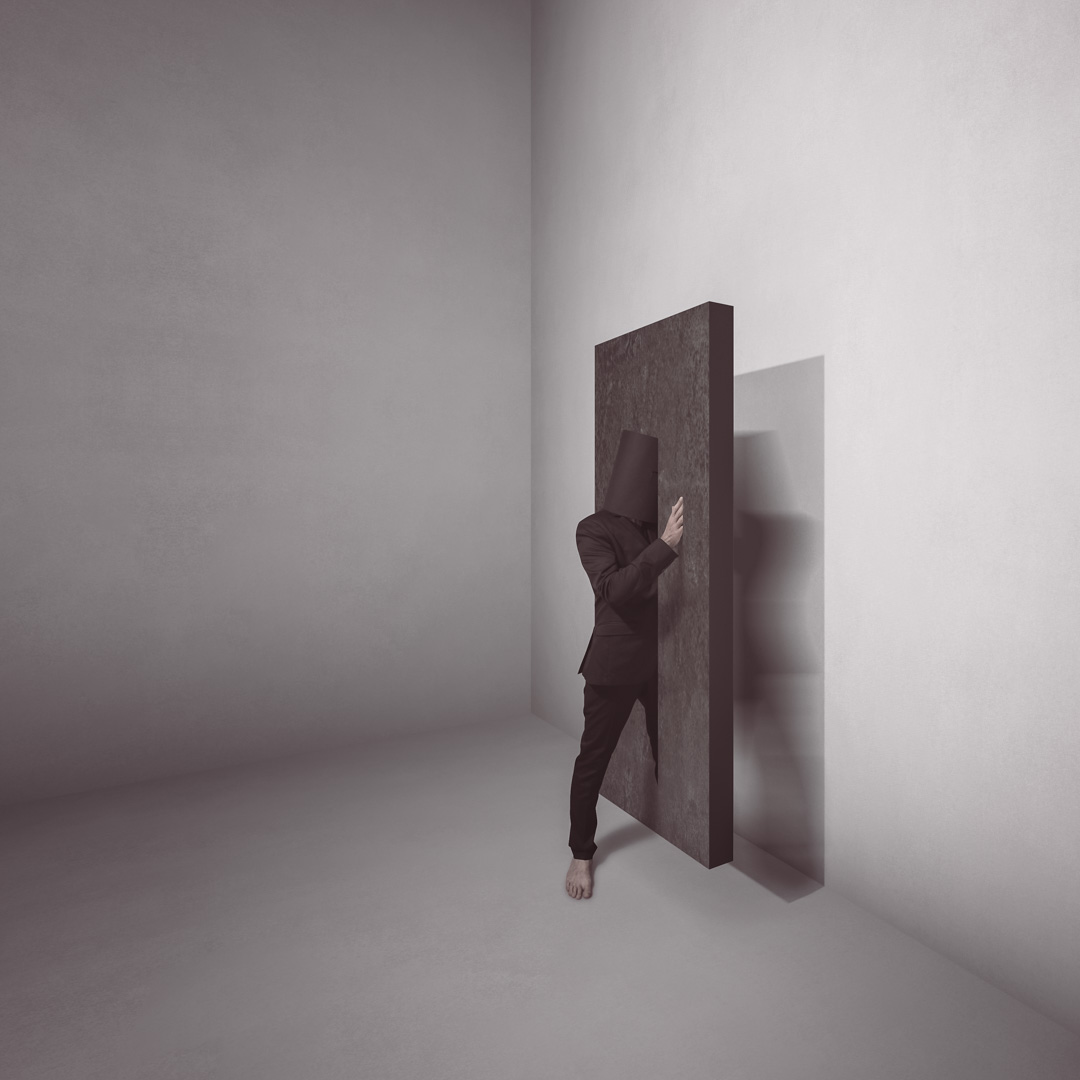
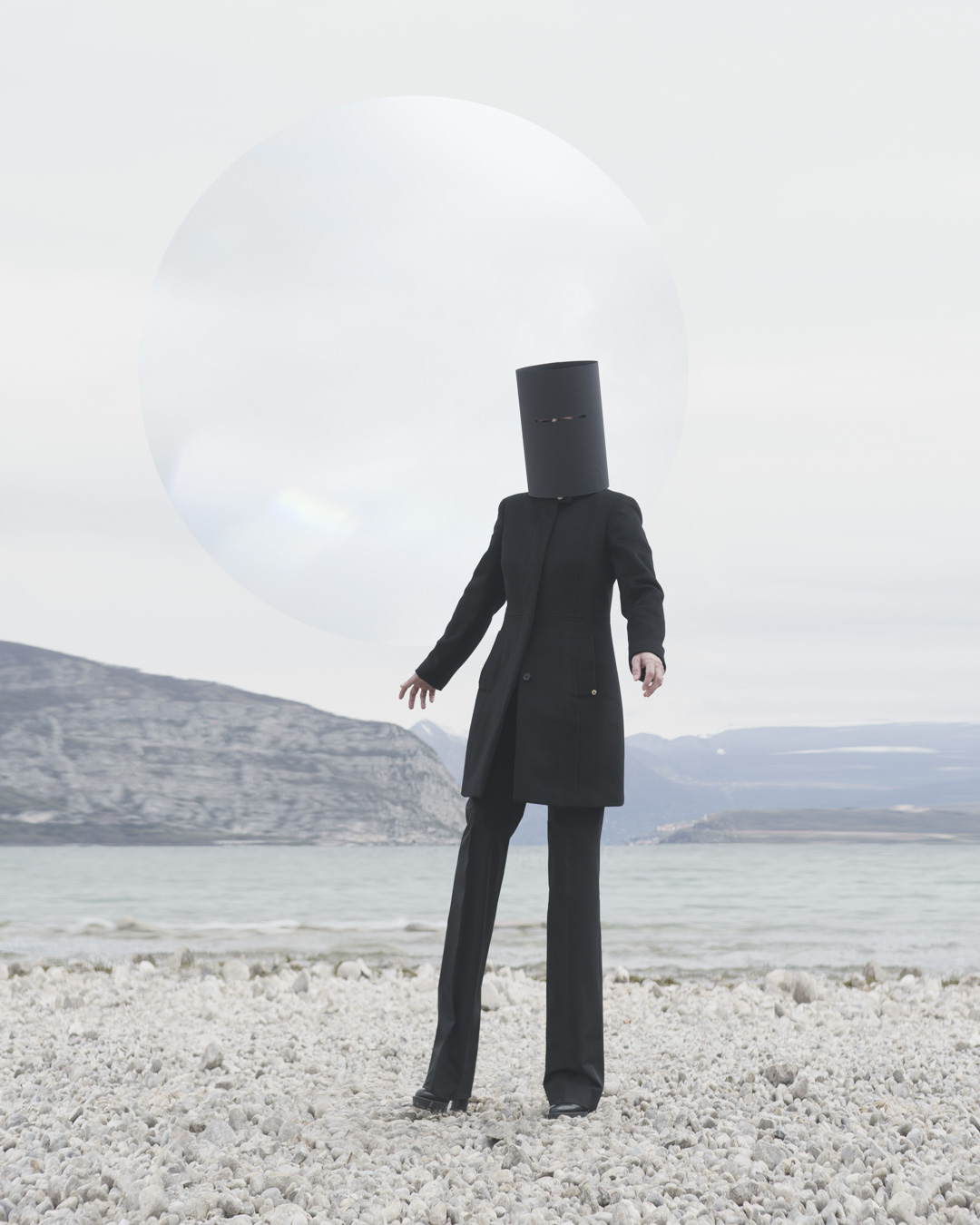
Un pedone con la testa coperta da un cilindro cade verso l’alto in un mondo a testa in giù. Un secondo pedone attraversa una parete e scompare.
Gli scacchi di Gianluca Micheletti funzionano così: una mossa apre il gioco, e la realtà si trasforma. Vestiti di nero, chiusi tra pareti di cemento o in piedi su una spiaggia, i soggetti di questa serie fotografica hanno il volto coperto. La maschera li priva di identità ma solo per diventare macchina del sogno: chiusa agli stimoli sensoriali, la mente intraprende il suo viaggio e quello che la fotografia coglie è l’istante del tuffo nella tana del Bianconiglio.
Nel fotomontaggio, Micheletti utilizza il linguaggio del iperrealismo ma senza calcare la mano verso una tridimensionalità forzata, effetto che ottiene mantenendo sempre la stessa griglia compositiva di stampo classico e giocando su colori smorzati o su un bianco e nero poco contrastato. La sensazione di immobilità non è quindi data solo dal gesto congelato ma dall’intero studio dell’immagine, come in un dipinto di Piero della Francesca. Rinascimentale è inoltre la semplificazione della figura umana e del paesaggio in volumi solidi e regolari.
Il sogno suggerito dalla fotografia di Micheletti non è perciò surreale ma metafisico: è il sogno di una pianta, è il sogno del mare. Al suo interno, l’umano non è che un incidente.
Gianluca Micheletti è nato nel 1972 e abita in provincia di Bergamo. Dopo essersi dedicato ad altre discipline, muove i primi passi nell’ambito della fotografia nel 2011, frequentando corsi e partecipando a diversi workshop dedicati alle arti visive. Nel 2012 decide di frequentare l’Istituto Italiano di Fotografia di Milano, presso cui vince la borsa di studio nel 2013 e il Project Book nel 2014. Questa voglia di crescita nel mondo della fotografia lo ha portato oggi a cambiare vita e diventare fotografo di professione. Per lavoro si occupa prevalentemente di fotografia corporate e still life prodotti e appena può, dedica tempo nello sviluppo di progetti personali nella fotografia di ricerca e di reportage.
A pedestrian with his head covered by a cylinder falls upwards in an upside-down world. Another pedestrian goes through a wall and disappears.
Gianluca Micheletti’s chess works like this: one move opens the game and reality changes. Dressed in black, closed among concrete walls or standing on the shore, the subjects of this photographic series have their faces hidden. The mask takes their identity away and it becomes a dream machine: shut off from sensory stimulus, the mind goes on its journey and photography seizes the instant of the dip in the White Rabbit hole.
In the photomontage Micheletti uses an hyperrealistic language, but he doesn’t go too far into a forced three-dimensionality. He obtains this effect maintaining the same, classic-inspired compositional grid and playing with muffled colors or with a b/w whose contrast is not that evident. The sensation of stillness is given not only by the frozen gesture but also by the whole study of the image, as in a picture of Piero della Francesca.
The simplification of the human shape and of the landscape in solid and regular volumes recalls the Renaissance.
As such, the dream suggested by Micheletti’s photography is not surrealistic but metaphysical: it is the dream of a plant, it is the dream of the sea. Within it, the human presence is just an accident.
Gianluca Micheletti was born in 1972 and he lives near Bergamo. After having dealt with other disciplines, he took his first steps in the photography field in 2011, attending courses and several workshops about visual arts. In 2012 he signed up for Istituto Italiano di Fotografia (Milan), in 2013 he won a scholarship and in 2013 he won the Project Book. His desire to grow in the photography field led him to change his life and he became a professional photographer. He deals with corporate photography, still life products and, as soon as he can, he develops personal projects in research and reportage photography.
L’ha ripubblicato su nic*.
"Mi piace""Mi piace"